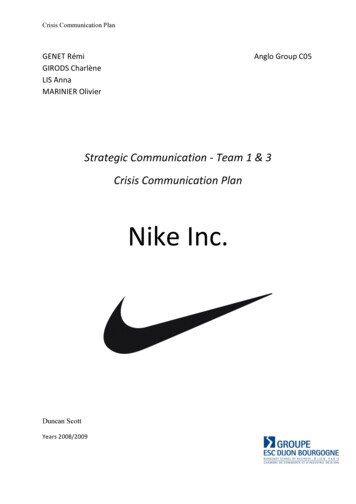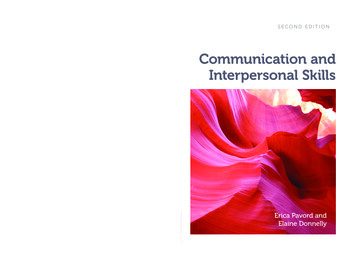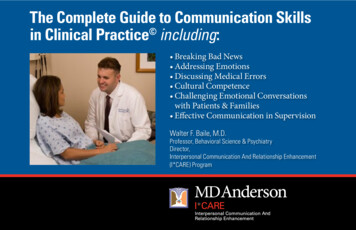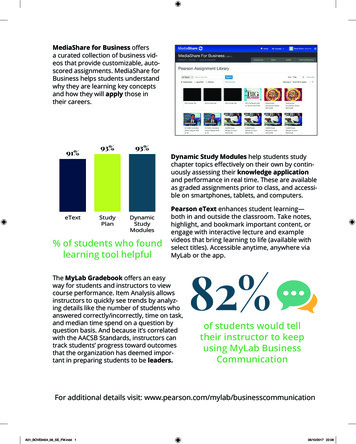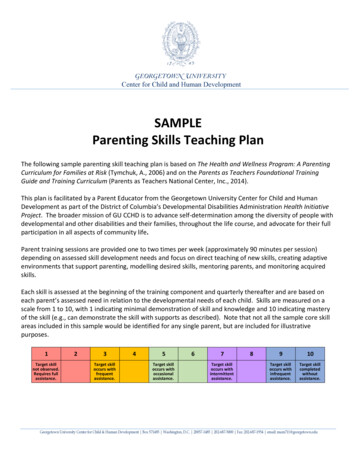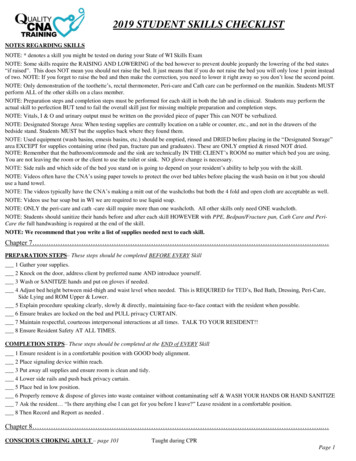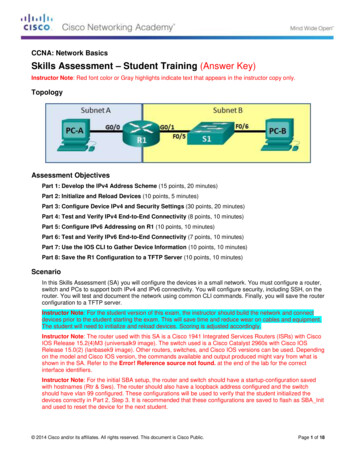
Transcription
Training PlanCommunication Skills Training
Training PlanCommunication Skills TrainingA Training Plan for Your OrganisationWhat is the purpose of the training?The purpose of the training is to initiate a process of rapid improvement, by means ofachieving a shared understanding of the correct knowledge and skills that we need to employ,if we are to achieve our stated goals.Communication Skills Course SummaryHow would you rate your communication style? Are you as clear, confident and persuasive asyou would like to be, or do you sometimes have trouble clearly expressing your ideas,thoughts and feelings?This ILM accredited course is for anyone who wants to improve their communication skills.You will learn how to create the right impression by improving all elements of effectivecommunication; effective speaking, writing, body language, voice tones, listening andquestioning skills. After attending this course, you will know how to eliminate many commonerrors and you will communicate with more clarity, confidence, authority, likeability andpersuasiveness.Learning Outcomes for the Communication Skills Course Improve your communication skills: Become more clear, convincing and persuasiveGain more confidence; present your message with assuranceHow to specify the exact meaning, so there is no misunderstandingThe proper (and improper) use of humour and office banterHandle conflict situations and difficult conversations with the right amount ofassertivenessEffective use of body-language gestures and voice tonesThe proper use of praise, appreciation and thanks: Always leave on a positive noteCustomer Review“This was an extremely welcome and focussed course, covering rational behaviour in theworkplace. Extremely useful tools for managing conflict and improving communication.The trainer was engaging and authoritative. The presentation was well paced, wellillustrated, with a good variety of group work, plus presentation.Tim HamiltonOpen DoorsPage 2
Training PlanCommunication Skills TrainingCommunication Skills Training Course OverviewThis course is split into two modules. The morning session covers developing yourcommunication style, so that you always make a positive impression in the minds of others.The afternoon session is about developing your communication skills, so you are able toeffectively handle difficult people and negative situations, in a positive way.We start the course with a self-assessment of your current communication style and find outwhat you want to gain from this training. We discuss the three main characteristics ofeffective communication: Clarity, Reason, Positive emotion. Everything you say creates animpression in the minds of others; we discuss how you can communicate, so that you leavethe right impression. We will discuss the importance of clarity in communication, giving goodreasons for your message and positive intentions.In the afternoon you will learn how to handle negative situations in a positive way. We discussthe various ways people respond to difficult situations. We will show you how to respond,replacing negative emotions and instead treating all people and problems “according to theprinciples of reason”. You will learn how to present yourself assertively, by managing yourlanguage, body language and voice tones. You will have the opportunity to practice your newskills in common conflict scenarios. You will finish the training day by learning how importantit is to finish every communication on a positive note.Customer Review“Having a framework really boosts confidence in this area, especially if you are new toleadership. I found the conflict management especially beneficial. The trainer wasbrilliant, friendly and engaging, with boundless enthusiasm. You know, from hispresentation, that he knows what he is talking about.Robyn FryerScience MuseumPage 3
Training PlanCommunication Skills TrainingCommunication Skills Training Course DetailsMorning SessionDefinition: What is Communication skills training?Communication skills training is about learning how to express your ideas in a clear,convincing, and inspiring manner. It is also about improving your ability to more fullyunderstand others, and to quickly resolve any conflicts that may exist between you.Communication skills training is about understanding others and making yourself clearlyunderstood.Purpose of Communication Skills TrainingAll good communicators are clear, convincing and inspiring.We need to know how to communicate in order to get the best performance from ourselvesand inspire others.If you are a clear, convincing and positive communicator, everyone will understand what youare saying, why you are saying it and they will get a good feeling about it.How to clearly communicate goalsWe are defined by our goals. And we are judged partially upon our ability to achieve the goalsthat are set for us. So, we must learn to effectively communicate goals. You will learn how tocommunicate goals in clear and unambiguous terms, particularly with regard to your targets,values, standards, expectations and feelings.Use numbers to gain greater clarityUsing numbers is the easiest way to improve the clarity of your language and help developgood communication skills. Numbers introduce exact times, exact quantities and morespecific information. They improve the quantitative nature of your language and make it lesslikely to be misunderstood.Use 8-part SMARTEight-part SMART is a set of eight questions which you need to answer, in order to ensureyour goals and plans are well communicated and fully understood.Page 4
Training PlanCommunication Skills TrainingPractice good humourSome people use humour in destructive and sarcastic ways. We should use humour only inconstructive and friendly ways. We need to distinguish between the incorrect and the correctuse of humour. The correct use of humour will help develop your interpersonal skills.How to clearly express your meaningSome people have difficulty expressing their thoughts. They say to themselves, “I know what Imean, but I can’t explain it”. You NEED to be able to translate feelings into words.And you need to be able to help other people clearly express their meaning by asking theright prompting questions. We will show you the best way to do this and practice with somereal-life examples.Improve your listening skillsListening is the art of gaining an exact understanding of the message.Understanding other people is a major communication skill.We will show you how to improve your listening skills.How to distinguish between a critic and a cynicMake the distinction between criticism and cynicism. We all need to hear valid criticism, butnobody needs to hear cynicism. You will learn to distinguish between the two communicationstyles, and you will learn how to transform cynics into critics.We will show you how to give only constructive criticism.Communicate using affirmative instructionsNegative statements often act as an unintended “embedded command”, putting into mindthe very idea that you wanted the other person to put out of mind.Since action follows thought, a person may be more likely to do the thing you are asking themnot to do. “Don’t panic”, implies panic.Therefore, it is important to frame your messages in the affirmative.We will give you opportunities to practice this important communication skill.Page 5
Training PlanCommunication Skills TrainingAfternoon SessionManaging the difficult conversation and conflictSome people are difficult to manage and therefore conflict situations are inevitable.Whenever there is tension or conflict, ensure your communication is clear, assertive andcontrolled.Communication requires you get the timing rightWhen you need to have a difficult conversation, it is important to get the timing right. Youcould say all the right things, but at the wrong time and place.We will help you get the timing right to improve your handling of difficult conversations.Communication requires you get the emotions rightConflicts have a tendency to trigger negative emotions in the mind, such as anger and upset.But too much anger and upset can make a bad situation worse. Therefore, you need tominimise the risk of triggering negative emotional responses.We will show you exactly how to do this and improve your interpersonal skills.Communicate using factual, objective languageWe will show you how to describe your message in objective terms.Objective language is your key to success and essential for effective communication.When in conflict, avoid the use of highly-charged emotional or derogatory language, and useonly objective language.We will practice developing this important communication skill.Communicate with the right level of assertivenessBe assertive but not aggressive, nor passive. Assertiveness is important. If you come-on toostrong, they will fight you; if you don’t come-on strong enough, they will ignore you.We will help you achieve the right level of assertiveness, clarity and confidence.Page 6
Training PlanCommunication Skills TrainingIn conflict, your objective is to take the heat out of the situationYou need to choose your words carefully. Sometimes it takes only one wrong word to causethe other person to explode.We will show you how to choose the right words to express yourself.Negotiate a way forwardInstead of arguing about the past, switch the conversation onto the future.This is a very important point: If you are going to argue at all, argue over the future, since thefuture is capable of being changed.Prepare your message in advanceWhenever possible, prepare your message in advance. You need to know what you mustrefrain from saying and what you will say.Good communication includes mastering the art of “self-editing”.Propose a definite solution to the problem or difficult situationYou need to propose a solution that is practical under the circumstances, and therefore morelikely to obtain an agreement.Distinguish reasons from excusesIf the person says NO to your proposal, then you need to know how to distinguish "reasons"from "excuses" for not doing something. You should give concessions to reasons, but not giveconcessions for excuses.Know when to compromise and when to stand firmCompromise is sometimes the right thing, and sometimes it is the worst thing you could do.We will discuss when to compromise and when to stand firm.Good body language and the use of proper voice tonesYou need to master your own posture, gestures, eye contact and facial expressions.In addition, you must master the pitch, pace and the volume of your voice.The proper use of praise and appreciationThe absence of appreciation can be the cause of conflict.We will discuss the need for effective praise, appreciation and positive reinforcement.Page 7
Training PlanCommunication Skills TrainingTraining Costs / InvestmentBespoke In-House or Live-Online Course 1,950 VAT per training dayPlus, hotel accommodation for trainer if needed (Premier Inn type: not the Hilton!)(International Price Varies)In-House training has been designed to provide a similar experience to our open courses,however we can tailor the content to fit your specific needs.We are able to train in your timezone.All our training includes: A full day of quality training, delivered by an experienced trainer Total of 6 CPD training hours (usually 9am - 4.30pm), plus an additional 2-3 via post-courseonline independent learning Full digital interactive course notes Training certificate Access to additional free training material after the course via our post-course portal 3 months free telephone coaching: Whilst you are implementing what you have learned, ifyou need to, you can contact us for support and guidanceWe suggest the following plan of action:Please send to us:1. Any amendments or changes you wish to make to the programme.2. Your thoughts.3. The next step you would like us to take.Thank you.Corporate Coach Training LtdWaltcot HouseParton RoadChurchdownGloucestershireGL3 2JJEmail: lindsey@corporatecoachgroup.comTel: 44 (0) 1452 856091Page 8
Training PlanCommunication Skills TrainingCustomer Reviews“The course content was excellent, thorough, informative, inspirational,enjoyable, practical and achievable. Personally, I found the positive thinkingelements less relevant, but I can see that it’s helpful to recognise that can be anissue for others so it’s definitely good to include. Trainer’s Presentation wasexcellent, thorough and inspirational. I was particularly impressed with how hedealt with slightly off-topic contributions from some attendees and also thosewith slightly less developed language skills. Very demographic.Michael BrowningThe Art Fund“The course content was structurally well organised and had a good set ofexercises, the training manual was easy to read and understand. The trainer’spresentation was engaging and interactive. The audience felt involved and Ilearnt some new techniques.Hiran ShettyCapita“This training course was just what I was looking for. The captions noted at theback of the book throughout the day have been exceptionally helpful. Thetraining day has been enjoyable with lots of interaction. As an introvert this is ahuge step in my development. Timings were kept, and the trainer was helpfulanswering various questions during the day.Claire JonesSolace“The course content was easy to understand, interesting and covered a variety ofimportant topics which were motivating and focused on self-awareness. Thetrainer was very good and explained all content very thoroughly and withenthusiasm.Lucinda CroftThorpe House Nursing HomePage 9
Training Plan Communication Skills Training Page 3 Communication Skills Training Course Overview . This course is split into two modules. The morning session covers developing your communication style, so that you

